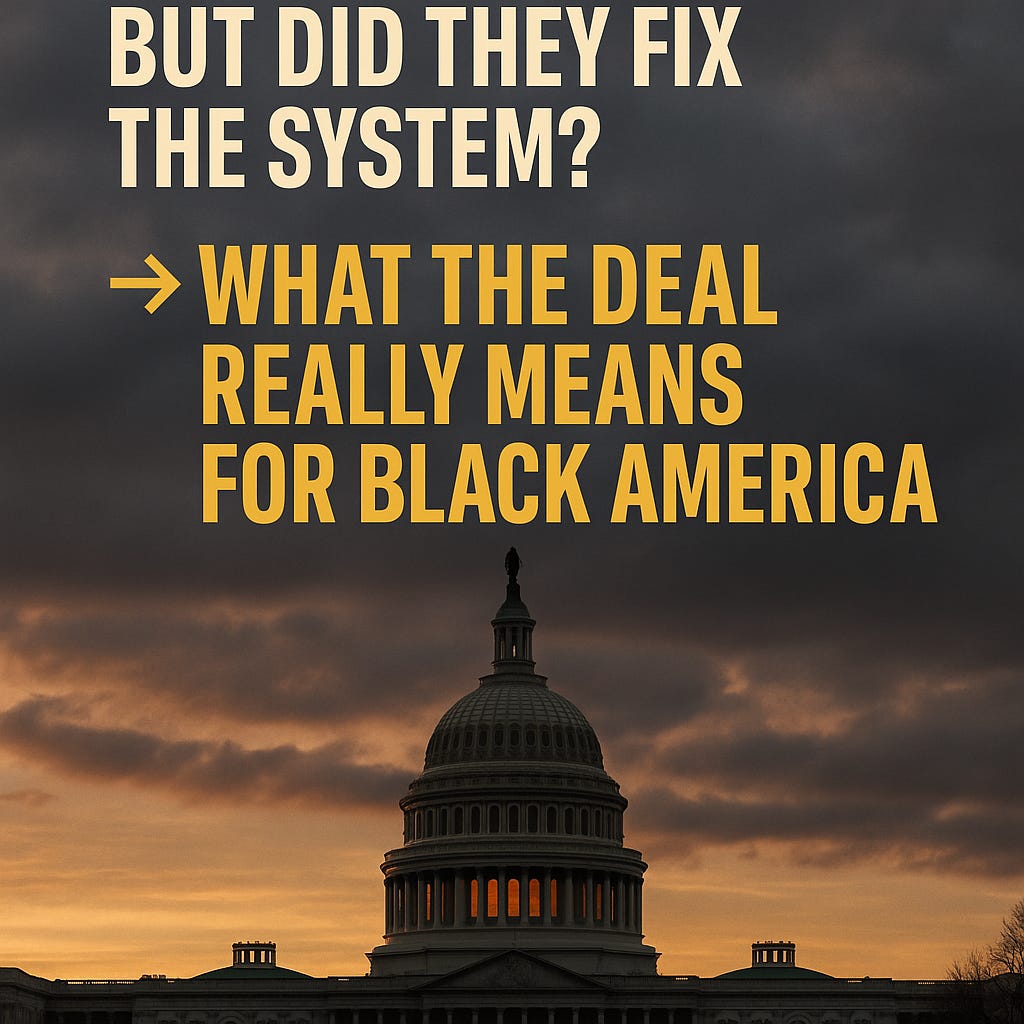The Shutdown Is (Almost) Over — But What Does It Mean for Black America?
After forty long days, the U.S. government shutdown — the longest in American history — appears to be coming to an end. A bipartisan group of Senators, including eight Democrats and one Independent, joined Republicans to advance a funding measure that would reopen the federal government, provide back pay for furloughed employees, and stabilize core agencies until at least January 2026.
This deal represents a rare — if fragile — moment of political cooperation in Washington. It passed the Senate after weeks of gridlock that left millions of Americans feeling the squeeze: unpaid federal workers, closed childcare programs, travel delays, and halted community grants.
Who Voted to End the Shutdown — and Why It Matters
Eight Democrats broke ranks with their party to vote with Republicans and the Trump administration on the funding bill. They did so in exchange for a promise: a future vote on extending Affordable Care Act premium tax credits, a lifeline that helps millions of Americans — disproportionately Black and Brown — afford health coverage.
The deal doesn’t settle every disagreement in Washington, but it does reopen the doors of government. For the workers who keep the system running — TSA agents, postal employees, USDA staff, and thousands of community-based program partners — that means paychecks will finally resume.
For Black communities, this isn’t just about government paychecks; it’s about economic oxygen.
The Cost of a Shutdown — and the Hidden Toll on Black America
During the shutdown, the ripple effects hit hardest where federal employment and federal aid overlap — and that’s in Black America.
- Black federal workers make up a significant share of the federal workforce, especially in agencies like HUD, Social Security, and the VA. When checks stopped, bills didn’t.
- Federal grants that fund housing programs, workforce training, and community health centers froze in place — delaying help to the people who rely on them most.
- Small Black-owned contractors working with federal agencies lost revenue they may never recover.
A shutdown doesn’t just “pause” the government — it compounds the inequality that already exists. When the system stops, those closest to the edge feel it first and longest.
Why This Moment Still Demands Vigilance
While the deal offers relief, it’s only temporary. Some departments are funded through 2026, but others are only covered until January. That means another political standoff could emerge in just two months.
And though the shutdown’s end is being celebrated, the structural issues — wealth gaps, healthcare disparities, unequal access to government contracts — remain. These are the very areas where federal stability and funding matter most for Black advancement.
Ending the shutdown is not the same as ending the struggle.
What Comes Next
For Black voters and advocates, this is a reminder that elections and accountability matter. The eight Democrats who crossed the aisle did so for a health-care concession — one of the few issues that touches nearly every family. The question now is whether that promise will be kept, and whether the programs that sustain our communities will get the funding they deserve.
As Washington reopens, so should our awareness. The fight for equitable budgets, fair contracts, and strong social programs is far from over — but it just got a second wind.
Brought to You By: Black Vanguard Media— amplifying the stories, policies, and people shaping the future of Black America.


